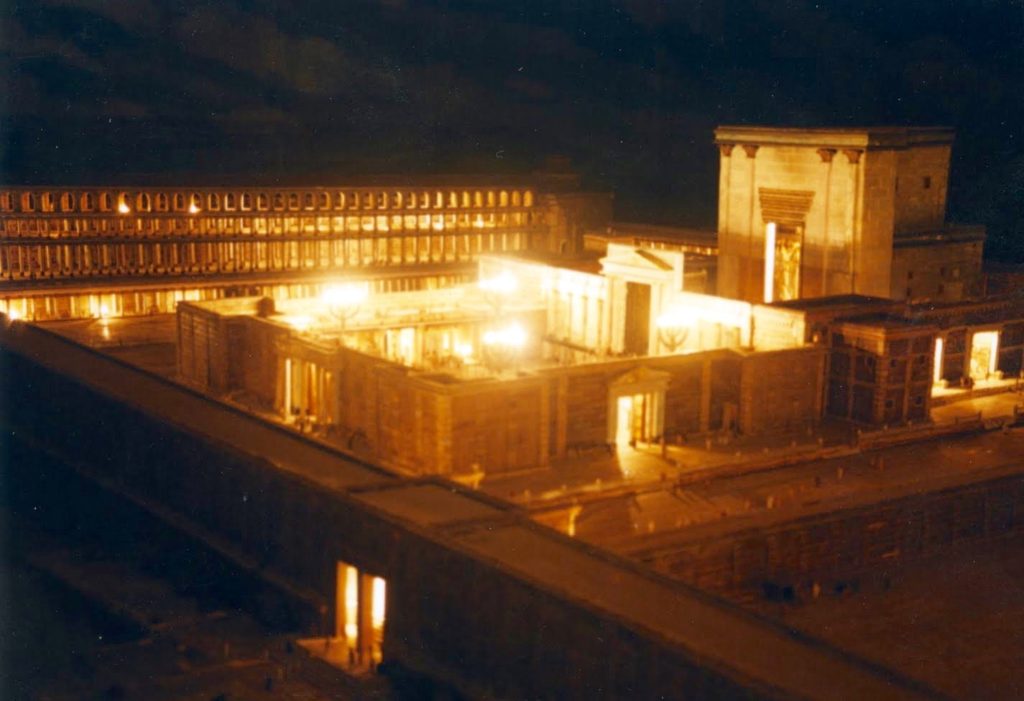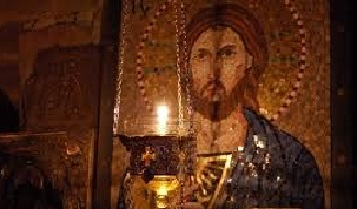Jesus & the Law – on honoring Sukkot … (11/25/18)
Sukkot (or The Festival of Booths) was another of the major seasonal celebrations commanded by the Law (see Leviticus 23:34-42 & Numbers 29:12-34), and as such it makes sense not only that Jesus would preach his message of radical legal reform in the lone instance where Sukkot is specifically mentioned in the texts1 (see John 7 & John 8), but also that he would subtly-yet-powerfully allude to the same at other times during his ministry as well. Consider …
.*While the Law mandated that all Jews make a Jerusalem pilgrimage to participate in the Sukkot celebration2, Jesus at first refused to do so altogether (see John 7:2-9) and then ultimately did so in secret (see John 7:10). More importantly, after arriving he didn’t participate in the festivities, but seemingly remained hidden from view until “the middle of the festival,” when he entered the Temple and began teaching instead (see John 7:14-24) – boldly criticizing the hypocrisy of his Jewish listeners (“Did not Moses give you the Law?` And yet none of you keeps the Law” ~ John 7:19) while openly calling for less adherence to tradition & ritual and more enlivening of God’s will (“Do not judge by appearances, but judge rather with just discernment” ~ John 7:24). A few days later, on the festival’s final day, he continued on with his tradition-challenging mission; loudly imploring all within earshot to come to him instead of the priests – to drink from the “living water” of his teachings instead of participating in Sukkot’s culminating ritual of pouring water upon the Temple floor (see Mishnah Sukkah 4:9 & John 7:37-38‘s “Let anyone who is thirsty come to me, and let the one who believes in em drink. For as the Scriptures have sad: ‘Out of the believer’s heart shall flow rivers of living water.’”3). Finally, and perhaps most tellingly, Jesus openly proclaims during the festival that he himself is “the light of the world” and that those who followed his teaching would be blessed with “the light of life” (see John 8:12) – a most rebellious utterance indeed, considering that the illumination of the Temple was one of the more important Sukkot rituals, and that the lamps thereof had probably only just been lit when Jesus made this call most bold.4

*Of course, not all of Jesus’ calls to religious reform were so blatant. Indeed, there were a few more subtle references to the mandates of the Sukkot celebration that he offered during his ministry as well. Where the Law demanded homage to the then-respected traditions of the Temple’s priests & elders to fulfill Sukkot’s primary purpose (that being: gratefulness to God for the guidance he had given the Jews during their Exodus from Egypt, and the freedom he had ultimately granted them thereby), Jesus spoke up at the conclusion of that very festival and said otherwise – unquestionably claiming that his teachings, if emulated, would provide the same liberation that Sukkot was intended to celebrate (see “If you continue in my word, you will truly be my disciples. And you will thereby know the Truth, and that Truth will set you free” via John 8:31-32) … In addition, where the Law demanded that celebrants live in self-made booths for the duration of the Sukkot week (see Leviticus 23:42-43 & Mishnah Sukkah 1:1-11), Jesus had made it quite clear that the true follower of his Way was essentially a homeless servant of his or her community; that “the Son of Man5 has nowhere to lay his head” (see Matthew 8:20 & Luke 9:58) … Finally, perhaps the most subtle reference of all unites the foundation of Jesus’ ministry (which was essentially spiritual rebirth via willing self-sacrifice – see John 3:3-9, John 13:15-17, & Matthew 24:12-14 et al) with the foundation of the Sukkot celebration (which was essentially the rebirth of Judaism via the Jews’ God-guided Exodus from Egypt) alongside the intriguing fact that Jesus was in all probability born during Sukkot itself.6
…………………………………………………..
1 Some scholars believe that Jesus’ ceremonial entry into Jerusalem near the end of his ministry (see Matthew 21:1-11, Mark 11:1-11, Luke 19:28-44, & John 12:12-19) occurred on or around Sukkot, and yet the majority of evidence rejects this notion. For starters, all four of the Gospel accounts follow said entry with Jesus & his disciples eating a Passover meal shortly thereafter (see Matthew 26, Mark 14, Luke 22, & John 13). In addition, while it is true that palm branches were traditionally waved during Sukkot, John 12 is the only “triumphal entry” recounting that specifically mentions palm fronds, and even here it is far more likely that said waving is being done to commemorate the liberation of Jerusalem some 100 years prior – as told by 1 Maccabees 13:51-52, a tale that would still have been well-known in Jesus’ day (“[And] the Jews entered [the Jerusalem citadel] with praise and palm branches – with the playing of cymbals and stringed instruments, and with the singing of hymns – because a great enemy had been crushed and removed from Israel. And Simon decreed that every year they should celebrate that day with great rejoicing.”). Indeed, it is highly telling that Jesus in all three of the Synoptic Gospels heads into the Temple itself shortly after entering the city to such symbolic fanfare and upturns the money-changing tables that were the primary source of priestly wealth & influence at the time.
2 Sukkot was & remains a celebration of thanksgiving commemorating God’s assistance during the Jews’ 40 years of wandering in the desert – a celebration during which Jews from all over the land would come to build their required “booths” all over Jerusalem and live therein.
3 Interestingly, the exact words “Out of the believer’s heart shall flow rivers of living water” are not found in any portion of any text in the Old Testament. That having been said, similar thoughts & connotations are frequently mentioned therein – see Exodus 17:6, Numbers 20:11, Psalm 114:8, Isaiah 44:3, Isaiah 55:1, Isaiah 58:11, Joel 2:23, Joel 3:18, Ezekiel 47:1, Ezekiel 47:12, Zechariah 13:1, & Zechariah 14:8 et al.
4 NOTE also Jesus’ similar proclamation in John 9:4-5 (“As long as I am in the world, I am the light of the world”), a proclamation made just after healing a blind man on the Sabbath – and just hours after Sukkot had culminated.
5NOTE that it would be most hypocritical of the humility-adoring Jesus (see Matthew 18:3-4 & Matthew 23:12) to repeatedly refer to himself in the 3rd person as “the Son of Man.” And indeed, with but a few exceptions, he more often than not refuses to do so (see Matthew 12:8, Matthew 13:37-43, Matthew 18:11, Matthew 20:28, & Matthew 24:30 et al) – using the phrase instead as it was primarily used in the Old Testament: as a reference to humanity in general (or at least the internal, enlivening essence thereof – see Numbers 23:19, Psalm 8:4, Psalm 53:2, Micah 5:7, Ezekiel 2:3 et al). Indeed, in most telling fashion, the only place in the Hebrew Bible where “the Son of Man” does refer to the lone Davidian Messiah (see Daniel 7:13-14), that messianic figure is shown willingly receiving exactly the same gifts of power & reverence that Jesus himself rejects after being offered them by Satan (see Matthew 4:1-10 & Luke 4:1-11).
6 The evidence for this postulation is multiple & varied – First: simply counting back 33.5 years (see Numbers 4:3 + Matthew 3:15, along with Luke 3:23, John 2, John 6, & John 13 et al) from the conclusion of Jesus’ ministry (which ended on his Passover crucifixion) has his birth occurring during Sukkot … Second: John the Baptist was conceived shortly after Abia (see Luke 1:5 + 1 Chronicles 24:10 + Luke 1:23-24 & Matthew 17:10-13) and therefore born around Passover. Jesus was conceived 6 months after John (see Luke 1:24-36) and was therefore also born 6 months after John’s birth – or 6 months after Passover; during Sukkot … Interestingly, if Jesus was indeed circumcised on the “eighth day” after his birth and if he happened to have been born on the first day of Sukkot, then his circumcision would have fallen on the Shemini Atzeret – the day of sacred assembly when the Jews completed and restarted their annual full reading of the Torah (see Leviticus 23:39). As such, the 8th day of Sukkot – the possible day of Jesus’ circumcision (and therefore also his officially cultural “birthday” as a Jew) – was essentially the annual fulfillment of the Torah; something Jesus announced as essentially being the primary purpose of his ministry in Matthew 5:17-18.





 ;
;